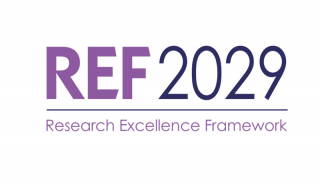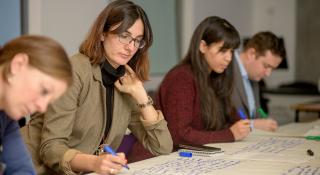
Breadcrumbs navigation
REF2029: Update on Politics and International Relations
Matthew Flinders (Sub-Panel Chair) and Ailsa Henderson (Sub-panel Deputy Chair) provide an update on REF2029 sub-panel 19 - Politics and International Relations.
4 September 2025 was something of a ‘double-day’ for REF preparations. The Minister for Science announced a short pause of up to three months to allow further sector engagement and to ensure the process is fully aligned with government priorities, and the members of all of the sub-panels were announced.
Pause button pressed
The pause is intended to provide an opportunity to simplify, streamline and reduce burdens on the sector. The results of the recently-concluded pilot assessment that examined ‘People, culture and environment’ will be published in October and this pause creates the space for learning and reflection. Although the overall REF timetable will not be delayed, the pause will affect certain milestones, including a delay to the publication of guidance modules and the REF 2029 Code of Practice approval process. REF will announce any changes to the exercise by December 2025. Our main roles as chair and deputy chair over the coming months will be to act as a link between our disciplinary areas, working closely with the Political Studies Association and BISA to (i) help shape any revisions to the structure of REF2029 to reduce the burdens and maximise the value of the process, and (ii) prepare the incoming panel members (see below) so that the criteria setting phase can begin early in the New Year.
Sub-panel members appointed
Although a temporary pause has been announced a big step forward was also taken when the members of all the sub-panels were announced. The full panel membership is set out below and we are delighted to be working with such a distinguished panel of people. The panel offers real diversity across a broad range of dimensions, and we are confident that it will be able to assess and showcase the breadth of excellent research to be found within our disciplines.
Sub-Panel Chair
Matthew Flinders, University of Sheffield
Sub-panel Deputy Chair
Ailsa Henderson, University of Edinburgh
Sub-Panel Members (Criteria Setting)
- David Galbreath, University of Bath
- Eleanor Bindman, Manchester Metropolitan University
- Inderjeet Parmar City, University of London
- John Garry, Queen's University of Belfast
- Leigh Jenco, London School of Economics and Political Science
- Richard Whitman, University of Kent
- Sophie Harman, Queen Mary University of London
Sub-Panel Members (Full Assessment)
- Bahar Baser Ozturk, University of Durham Joint with SP25
- Berit Bliesemann de Guevara, Aberystwyth University
- Bernhard Blumenau, University of St Andrews
- Chris Hanretty, Royal Holloway, University of London
- Claire Dunlop, University of Exeter
- Gulshan Ara Khan, University of Nottingham
- James Pattison, University of Manchester
- Jonathan Tonge, University of Liverpool
- Katharine Millar, London School of Economics and Political Science
- Patricia Owens, University of Oxford
- Patrick Thomas, House of Commons Joint with SP25
- Peter John, King's College London
- Roberta Guerrina, University of Bristol
- Sarah Shair-Rosenfield, University of York
- Will Jennings, University of Southampton
- Will Leggett, University of Birmingham
Panel secretary
Tessa Piper Coventry University
Panel membership and future appointments
We want to thank everyone who applied to be on sub-panel 19. We had a very large number of applications to sift through and there were lots of brilliant people who, if we’d had the space, would have included on the panel. However, the panel may well need to make additional appointments in the future. Specific sub-fields and areas may need additional coverage, and initial appointees may have to step-down from the committee for all sorts of reasons.
So please do keep an eye on PSA and BISA announcements because these will be the main routes for promoting opportunities.
It’s worth reflecting on the role of PSA and BISA in this process and acknowledging their role and professionalism. A lot of the day-to-day work of learned societies happens ‘off stage’ but it is absolutely crucial to maintaining the health and professionalism of our disciplines. With this in mind, we just want to say thanks to the PSA and BISA representatives that played such an incredibly helpful role in helping us shape the panel that has just been announced. We will keep working closely with PSA and BISA as and when new panel opportunities emerge, and in relation to the REF process more generally.
Final thoughts
It would be slightly odd if we did not acknowledge the existence of what might be termed ‘a little turbulence’ around REF2029 which is itself a reflection of the wider economic challenges and pressures that universities are under in the UK. All we can say on this is that we will do everything we can to act as positive and inclusive administrators and ambassadors for our disciplines as the process moves forward. If anyone has any thoughts or comments about REF2029 that they would like to raise with us then please feel free to email (m.flinders@sheffield.ac.uk). Beyond this we’ll be providing PSA and BISA with regular updates, and REF-focused events will be organised just as soon as the final structure has been agreed.
Matthew Flinders, University of Sheffield
Ailsa Henderson, University of Edinburgh


